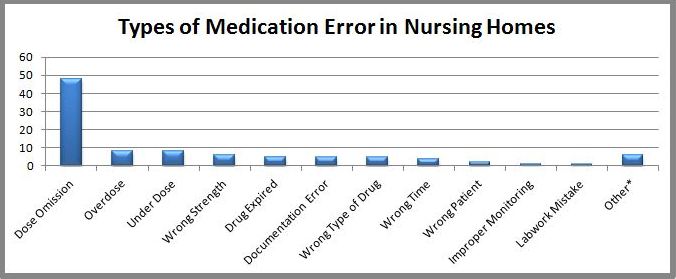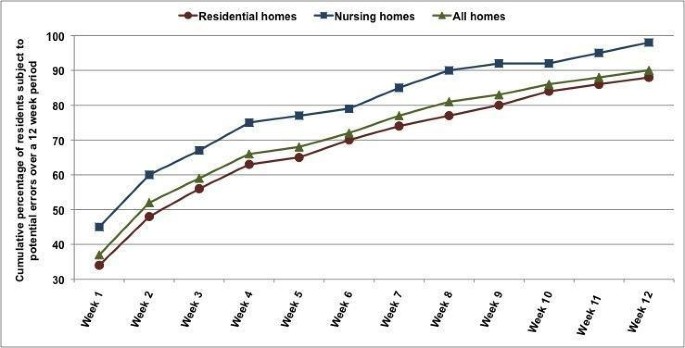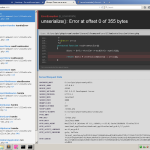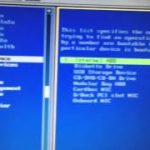Table of Contents
Approved
These troubleshooting tips are worth reading if your computer is showing error rates when taking medication in nursing homes. They found that medication errors were common: 16% to 27% of residents participated in studies of all types of medication errors, while 13 to 31% of residents viewed studies that looked at errors.
They found that medication errors were repeated, with 16% to 27% of residents participating in studies of various types of medication errors, and 13% to 31% of additional residents in courses focusing on related errors when moving.
Since many nursing homes are understaffed, staff can become overworked and then fatigued, increasing the likelihood of mistaken medication. An employee can go off the rails during a medical pass and are more likely to make a mistake. A scientific study conducted by the Medication Error Quality Initiative looked at the most common medication mistakes.
Medication errors are a common dilemma in hospitals and nursing homes. Government inspectors are required to determine a certain level of medication error during each examination. The frequency of medication due to errors should be below the acceptable percentage. If the number of errors was higher than the norm, the service department should develop a plan to correct these errors.
Medication Standards For Seniors
According to a study published in the Journal of the American Geriatric Society, 16 to 27 nursing home residents experience medication errors. Although death from inappropriate medication is very rare, other complications are possible.
Provide the patient with crazy medications.Prescribe the wrong dosage.Ignore medical history and victims.Providing medications that should not be taken together.Poor monitoring of medication intake.Ineffectiveness of drug treatment.Poor preparation.
The margin of error for prescription drugs in nursing homes should not exceed five percent. While minor mistakes are inevitable, anyone who needs an intermediate stepIt should be free from many mistakes when taking medication.
A drug error occurs when it differs from your information, doctor’s prescription, or manufacturer’s recommendation, if it does not meet professionally acceptable standards for the drug.
Serious flaws can be seen as a nursing home that doesn’t remember or even abuse.
Approved
The ASR Pro repair tool is the solution for a Windows PC that's running slowly, has registry issues, or is infected with malware. This powerful and easy-to-use tool can quickly diagnose and fix your PC, increasing performance, optimizing memory, and improving security in the process. Don't suffer from a sluggish computer any longer - try ASR Pro today!

If you or a loved one fails to take a prescribed medication in a nursing home resulting in serious injury or death, you may be eligible for compensation. For more information, see No incident overview.
Taking Medication In A Nursing Home
In most medical institutions, the medical staff fills out the so-called “medical passport” with drugs. Is this term used to describe the process of dispensing medicines to residents of health care facilities at your command?
The nurse usually uses the trolley every time she has a medication card and transfers medication from resident to resident according to the guidelinesAs a doctor.
General medical passes are issued by registered nurses. On the other hand, some states generally allow unauthorized staff to offer you medications, provided the nurse is definitely watching. Med-Pass usually takes 4 to 5 hours with you.
In addition to taking medications, it can take several hours on the marketplace to synchronize medications and document medications.
Examples Of Mistakes When Taking Medication
To specify F332, the margin of error must be 5% or more. Rounding off a fabulously low rate (eg 4.6%) to a specific rate of 5% is not allowed. A medication error rate of 5% or more may indicate that the facility is experiencing systemic problems with the delivery system.
There are several types of medication errors that can occur in a nursing home.
- Cut or like a pill that shouldn’t crack: find yourself. These can be tablets or tubes with instructions to avoid crushing.
- Insufficient moisture. Many medications contain instructions on how much to drink with the prescribed medication. If the resident does not replenish this amount of fluids, it is imperative that they are not sufficiently hydrated and some medications can be harmful to the resident.
- Using inadequate antacids or nutrition: Some medications require the resident to usually take the medication with or without food. Some require the antacids to be known before taking any medication. The caregiver is responsible for administering the medication correctly.
- Do not mix, shake, or withdraw the medicine: some medicines require special shaking or stirring before ingestion. In all cases, if the medicine is well mixed, there is a risk that too much or too little medicine will be administered to the patient. This includes insulin headsets and other suspensions.
- No enteral supplementation: some patients can take enteral nutrition (diet includes tube). There are practical guidelines and guidelines that can be followed when prescribing medications to these patients. If this protocol is not followed, there may be a treatment error that harms the patient.
- Incorrect use of eye drops. Some ophthalmic medications need to be injected directly into the eye. Nursing home worker I must make sure that the eye drops are in the eye for a period of 3 to 5 minutes (approximately minutes) so that all the medicine is absorbed. Failure to do this is the drug’s fault.
- Allow passengers to take sublingual medication: Some patients will be very reluctant to take sublingual pills. If the resident takes the sublingual tablet repeatedly, the medication must be changed.
Get a free case report if you or your loved one has suffered from all of these or other medication errors. You can get financial assistance for medical treatment as well as other expenses.
Errors When Taking Medication Due To Carelessness
Because many nursing homes are understaffed, staff are overworked and fatigued, increasing the risk of mistaken medication. During the Western Mediterranean, the manliness of the staff can be distracting and the transition can be confusing. The person creating the Scientific Pass should not rush as this can lead to medication errors.

In a study by MedicationThe Error Quality Initiative covered the most common mistakes when taking pills.
- Incorrectly documented treatment.
- Lack of monitoring of the resident with a later injection of the drug.
- Follow the bad routine of the Mediterranean.
- Take expired medicines.
- Give too little or skip your medication.
- Giving too much medicine
- To administer a medicine found at the wrong time or at the wrong time.
- Wrong form of medication, wrong dosage or wrong medication
- Research lab error.
- Using the wrong medication technique.
Medication Error
There are several malpractice-related issues that residents of health care facilities who are being prosecuted for malpractice for personal injury as a result of malpractice may face.
- Medication redirection… When subscribing employees redirected a drug, it was usually about theft for their own use. You may also need to sell the drug to others.
- Ignore on Order: Some employees ignore administration instructions and change the setting, add medications that were not purchased, or stop taking medications.
- Medications On Borrowing: Employees are busy during the General Medical Clearance and may run out of medications. Instead of purchasing the appropriate medication, a Mediterranean Pass person can borrow medication from one resident to another. If my error is not documented, it can be identified.
- Misuse of medicines. This is because the health facility does not provide the required medication, and the nursing home resident does not really have the medication.
Complaints About Errors In Taking Medication In A Nursing Home

Inappropriate drug administration can lead to serious illness or even death of the resident. Making a complaint about anDomestic violence against Birkenstock can help you achieve justice for those who have harmed your loved one and help you make sure others are not harmed.
The Nursing Home Wrap Up Show offers total financial compensation for the burden of your loved ones who can help you with strategy and other expenses.
Nobody should help you in weaker years. If your loved one went unnoticed due to bullying in Birkenstock, or we can help you.
Get a free trial today to see if you or your loved ones are eligible for compensation.
The description of the medication error includes the pitfalls that occur when medication is administered to residents.
According to a study published in the Journal of the American Geriatric Society, 16 to 27 percent of all nursing home residents have experienced medication errors. Although death insurance due to medication errors is rare, other complications are possible.
Give patients the wrong medicine.Prescribe the wrong dosage.Ignore women’s medical history.Provide medications that should not be takenGet together.Poor monitoring of medication intake.Failure to provide medication.Poor preparation.
Because many nursing homes are understaffed, office workers can be overworked and beaten, increasing the likelihood of medication errors. The employee may be distracted during the medical exam and make mistakes. Perhaps a study by the Medication Error Quality Initiative addressed the dilemmas associated with the most common drugs.
To specify F332, the margin of error must be 5% or more. Rounding off the rate below (eg 4.6%) to 5% is not allowed. A pill error rate of 5% or more may indicate that the facility has endemic drug flow problems.





